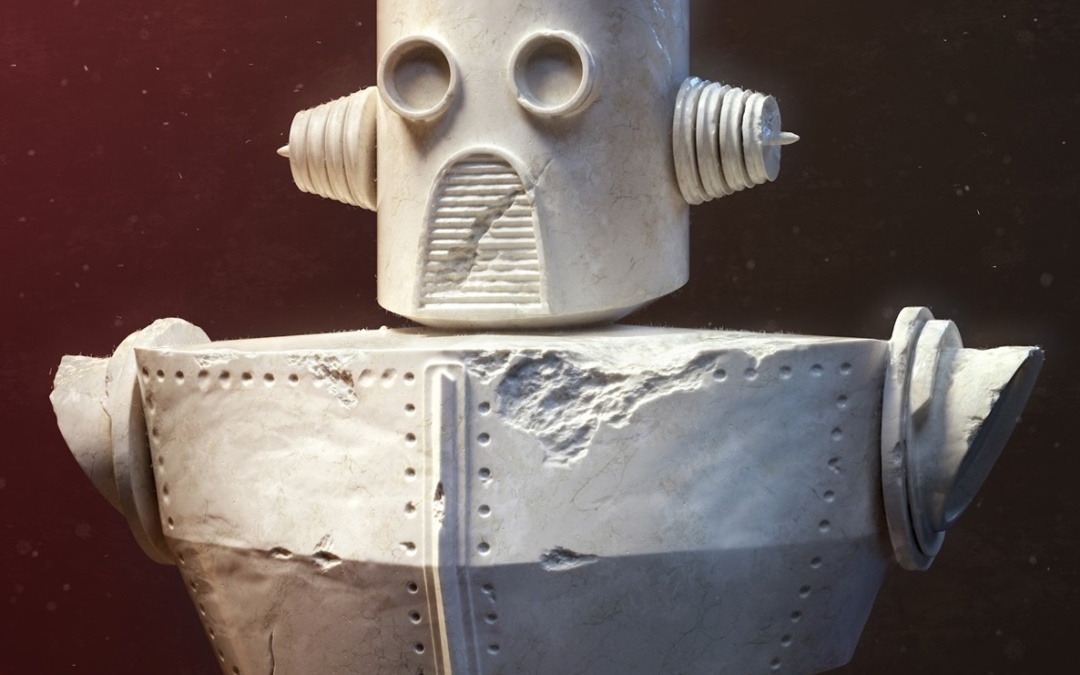
by Caitlyn Champ | Sep 3, 2019 | albums, review
Electro-pop-punk duo Lady Lightning co-fronted by Graci Carli and Tony Bush released their debut EP album titled Sleepover in May of this year. The Brooklyn based band receives inspiration from 80’s style pop-rock legends Kenny Loggins, Debbie Harry, and Michael Jackson, and it definitely shows throughout all of the tracks on this first album. Truly a work for those seeking motivation for growth and empowerment, Carli and Bush provide a place to come home and re-energize to.
Woven throughout the tracks is a thread of religious verbiage, seen quite obviously in the first song “Heaven” but also in “Blame” and “Hero” as well. Choosing to drive songs with their upbeat musical styling and intricately woven vocals each track features both a whimsical and passionate air about it; with the message of self-care and appreciation never in doubt. If listening closely you may even be able to find small hints of Bleachers and Fall Out Boy vibes among the tracks, specifically “Hero” and “Lucky Love”.
Perhaps the most unique song on the album though is “Blow”, flashing an angrier beginning than any of the other tracks. The fervor of finally having made it and being able to show off their hard work and dedication provides the basis for the song while still leaving you with an inspired feeling to continue to put the time and effort in.
Rounding the album off with “Enough” the duo goes all out singing about the importance of believing in yourself. As the most up-beat track in the work, it will remind you of every great Disney movie you’ve ever watched. Featuring the lyric that potentially describes the entire album the best, “it’s hard to feel the good if it never gets tough” “Enough” is the perfect ending to an inspiring album.
Keep up with Lady Lightning on Instagram.

by Caitlyn Champ | Sep 3, 2019 | albums, review
Phebe Starr is back and brighter than ever with her new EP Ice Tea Liberace which was released on August 30 of this year. Showcasing an impressive musical vision and a wide range of vocal talent this four-song album will be the perfect kick start to your Fall music lineup. With songs mainly centered around a loss of innocence and having to come to terms with growing up, listeners will get a clear sense of Starr’s diverse musical style and opinions on the world.
Choosing to start off the album with its title track “Ice Tea Liberace” you’re immediately dropped into the mystical land Starr will journey through over the course of the four songs. Featuring a renaissance-meets-hip-hop vibe, this track has a unique blend of sound coming in from a wide range of instruments and background beats. The staccato lyricism pushes the song along and provides for a clear focus on the words themselves, a call to the return of an older world, a rebellion against how things are now. “Ice Tea Liberace” is both powerful and original, exactly what you would want from the opening track.
Starr’s next track “Bad News” opens with a tribute to the late Johnny Cash’s “Ring of Fire” before moving toward her sleek and lustrous vocalism. A stark contrast from the first song, this one focuses more on the lyrics than the instrumentation. Drawing the listener’s attention to the chorus with the repetition of the B in Bad is a stylistic technique Starr has mastered and brings out in later songs as well.
The third track of the album, “Break the Law”, starts off a little different with Starr choosing to bring an acoustic-style sound into the mix. “Break the Law” is also distinctive in the strategic use of lyrical pauses letting the beat carry the song. A song to rave to at a basement party “Break the Law” sounds like a cross between Halsey and Billie Eilish with its roots planted firmly in the bad girl world.
Last but definitely not least, the last track on the album “Touch XXX” rounds us off in an emotional yet gentle way as if falling into a pool of perfectly calm water. Showing off her range here, you can truly get the feeling for how strong of a singer Starr really is. The kind of song that makes you close your eyes and feel the music, “Touch XXX” will take you on a ride of pure ecstasy.
Gifting us with a complete emotional journey Starr has succeeded in creating her own world for listeners to soak in. As the sole singer/songwriter on the album, it’s no wonder her true identity shines so clearly throughout the work. The most perfect blend of soul and power, Ice Tea Liberace will have you rebelling against societal norms before you know it. When asked about the new album Starr said, “I’ve constantly been expected to play a role. I think a lot of women have these expectations placed on us. Labels make people feel safe. Social identities make people feel like they have control over life. I’ve learnt those people may feel safe but they aren’t free. I’ve learnt that being outcasted for who you are is more enjoyable than being accepted for something you’re not.”
Be sure to check out Starr’s other music on Spotify.

by Meredith Schneider | Sep 2, 2019 | albums, review
On Friday, indie pop powerhouse G Flip released the highly anticipated debut full-length About Us. From the first seductive lines of “Lover” to the last winding, beautiful chords of “2 Million”, this album is packed to the brim with ambient sounds that will help you transition into the autumn months with ease. “I Am Not Afraid” could stand the test of time as, lyrically, it is comforting in a relatable – and, at times, melancholic – way. Lines like “And I’ve cried/I am not afraid to do this alone/I know that it scares you but I am my own home” establish G Flip’s independence as she shatters expectations around relationships, encapsulating a special type of vulnerability for the listeners.
The first time we had the pleasure of witnessing G Flip do her thing was at SXSW 2018, and we had the divine pleasure to see an encore performance the very next day. From just those two appearances – which marked her first, officially, in the US – we were captivated by her stage presence, enlightened by her musical talents. To say that we have been excited about this release for quite some time would be an understatement, and I have to admit that the completed work completely eclipsed our high hopes. “Drink Too Much” was one of those initial songs we had the pleasure of peeping, and are so thrilled that it made it onto this work. This track is for anyone who has ever mirrored the thought “I just want to get into trouble,” knowing that said trouble has caused them to apologize in the past. It’s that subtle balance of letting go and holding on that G Flip tends to play with lyrically, and this jam defines itself by making the whole topic club-ready. Topically, she follows that part of the journey will, as “Morning” and “Waking Up Tomorrow” both address waking up alone after making a few mistakes. (Could they have been the direct result of a night out like in “Drink Too Much”?)
This musical journey then takes us to the aftermath of relational issues without a complete fallout. Once again, G Flip hits us right in the gut with “Stupid”, one of her more recent singles from this release that really illustrates the push and pull of a relationship through trying times. In line with its predecessors, its introspective nature make it perfect for a nice, breezy night on the patio, however its pace and instrumental makeup could easily have it placed as your go to “dance it out” track — in public or otherwise. Seventh track “Killin’ My Time” is how we initially introduced this talent to our friends and family post-SXSW. Raspy vocals, setting boundaries, and doing it all with an uplifting composition holding it together.
We are completely carried away by ballad “Bring Me Home”, a showstopper if ever there was one. This track leads right into “About You”, another SXSW 2018 staple that has been running circles in our minds ever since. While G Flip struggles emotionally with the aftermath of ultimatums, the pain of a tumultuous relationship is palpable. Meanwhile, she’s still managed to hook us with an enigmatic composition that would keep any human dancing into the wee hours of the morning. The album is wrapped up with a cliffhanger — literally and figuratively — as G Slip addresses the constant change of life, and all of the endings that could be. It prompts the listener to examine the open-endedness of their own lives, and to adjust to accept change. I am thrilled with the sheer attention to detail that G Flip offers in her catalog, and absolutely enamored by the thought put into the entire journey that About Us provides.
Keep up with G Flip here.

by Meredith Schneider | Aug 30, 2019 | albums, review
The energy that bursts forth with each new stanza in Caravan Palace‘s new release – a full-length titled Chronologic – is undeniable. From the fade in on first track “Miracle”, unwavering positivity is thrust upon your eardrums, a soundscape and attitude we have been craving for quite a while. As politics rears its ugly head at us from all sides in the art community, allowing ourselves to pour such invigorating lyrics into our ears feels like a welcome escape from the world’s melancholia. (There is a song on this release specifically titled “Melancolia”. But we will get to that in a moment.) The soundscape gets theatrical with “About You”, a track the Parisian group concocted with a feature by Charles X. “Moonshine” brings with it a more relaxed vibe that fits the title well.
Here’s where we get to “Melancolia”. While we see the reflection of a slower pace that mirrors the title, the song itself is still smooth as silk and just as easy to dance to as its predecessors. At no point does our mood dip while listening, which speaks to the psychology behind the soundscape. “Plume” brings the pace back up, with sounds reminiscent of Alexandra Stan’s “Mr. Saxobeat”. This one could – quite frankly – hit the airwaves and pick up speed with a dancing crowd. “Fargo” gives us sunshine-soaked, lazy morning brunch vibes, while “Waterguns” boasts more of that hit single potential, featuring vocals by Tom Bailey. “Leena” slows it down again, allowing an introspective breather and – truly – a ballad-like feel to enter the Chronologic journey. “Supersonics” feels like an extension of the wonderful dance groove we felt with “Plume”, leading into tenth track “Ghost”, which has a more ethereal feel, the most literal translation of its title we could ever hope for. “April” brings with it an instrumental energy that is balanced out with cool, crooning vocals. We couldn’t think of a better way to round out this fabulous new release.
Now, go infuse your holiday weekend with this happiness. On repeat!
FALL NORTH AMERICAN TOUR DATES:
09/28 Mexico City / El Plaza Condesa
10/01 Boston / Royale
10/03 Washington DC / 9 :30 Club
10/04 NYC / TERMINAL 5
10/05 Philadelphia / Union Transfer
10/07 Montreal / Mtelus
10/08 Toronto / Phoenix Concert Theatre
10/09 Detroit / Garden Theatre
10/11 Chicago / House of Blues
10/12 Minneapolis / First Avenue
10/14 Denver / Ogden Theatre
10/17 Seattle / The Showbox
10/19 Portland / Crystal Ballroom
10/21 Oakland / Fox Theatre
10/22 Los Angeles / The Wiltern
10/23 San Diego / The Observatory North Park
10/27 Austin / Mohawk
10/29 Dallas / Granada Theater
10/31 Atlanta / The Masquerade (Heaven)
Keep up with Caravan Palace here.

by Meredith Schneider | Aug 23, 2019 | albums, review
From the very first, slow chords of the title track, to the final, crawling notes of twelfth song “Piano”, artful indie pop artist Lina Tullgren‘s new album Free Cell takes you on a steady, beautiful sonic journey that you will not regret being a part of. Songs like “110717”, “Bad At Parties”, and “Wow, Lucky” are introspective, slightly more specific in their disposition but still highly relatable.
And perhaps that’s most of Tullgren’s pull. Since the first time we heard her quirky, ethereal vocals, we’ve felt well-placed bits of emotion tugging at our heartstrings in every one of her tracks. Free Cell is no different. Relating to your artist is key to identifying with a song sometimes, though Tullgren leaves little room – if any – to mistake these feelings as something else.
Pop this bad boy on and play it behind your next picnic, patio party, road trip, or while you’re cooking. Let yourself be at peace with this music. It’s totally worth it.
P.S. When you do listen to “Wow, Lucky”, please then be inspired to use tarot cards, but don’t ask them to tell you your fortune? The future is up to you, baby!
Purchase Free Cell here and keep up with Lina Tullgren here.

by Meredith Schneider | Aug 23, 2019 | albums, review
Today, Dallas-based rock collective The 40 Acre Mule releases their latest full-length, a 10-track album titled Goodnight & Good Luck. Filled to the brim with incredible chord progressions, guitar riffs that will melt your face down to your teeth and cheekbones, and an undeniable energy that just simply will not quit. Their musical prowess has them dipping the journey into a smooth, natural slow roll a couple of times – how else can you do bluesy ballads like “Be with Me” and “Hat in Hand”? – but for the majority of this release, we spend our time checking our increasing heart rates.
The band – comprised of J. Isaiah Evans (Vocals/Guitar), John Pedigo (Guitar), Tim Cooper (Bass/Backing Vocals), Robert Anderson (Drums), Chris Evetts (Bari Sax/Percussion), and Chad Stockslager (Keys/Backing Vocals) – effortlessly blends the sounds of their great predecessors (Chuck Barry, Little Richard) and modern influences (J.D. McPherson, Nathaniel Rateliff) to create a sound that is simply undeniable, and truly one all their own.
If you’re looking for album favorites, we’re very into the clear nostalgia that rolls through us while listening to “Shake Hands with the Devil”, and are thoroughly drawn to the title and danceability of “Bathroom Walls”. Perhaps both songs present the sense of a thrill for a moment, thematically tying us to the album as a whole as it takes us on a thrilling ride.
Peep Goodnight & Good Luck below, and be sure to nab your copy soon!
Keep up with 40 Acre Mule here.






